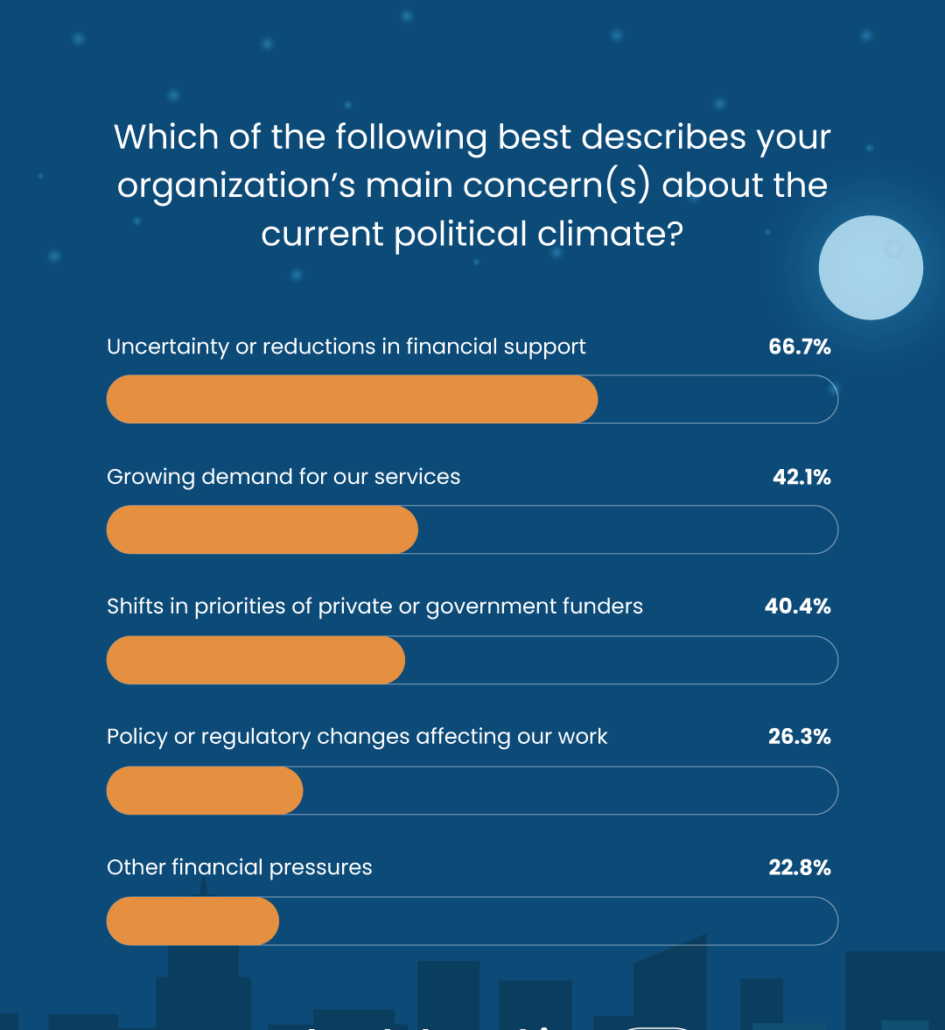For many in the social good space, the world feels upside down. That’s why we’ve launched a new survey series — to explore the uncertainty and turn it into something useful.
Our first survey asked leaders from across the social good ecosystem to weigh in on the biggest challenges they’re facing in today’s volatile political and economic climate. The results offer a glimpse into the concerns keeping organizations up at night, the most pressing questions leaders are wrestling with, and words of encouragement for navigating what’s ahead.
 Who Participated? A Snapshot of Our Respondents
Who Participated? A Snapshot of Our Respondents
We gathered insights from a diverse group of 57 participants, each offering unique perspectives based on their experiences and roles within their organizations. Our respondents included professionals from various sectors, with a strong representation from nonprofits, government agencies, and community-based organizations. The participants were actively engaged in mission-driven work, focusing on community health, education, housing, social services, and advocacy for marginalized populations.
Sector Representation
- 93% of respondents came from nonprofit organizations, highlighting the perspective of those working directly on the front lines.
- A small number of respondents represented other sectors, including government agencies, faith-based organizations, and for-profit companies engaged in social impact work.
Role Representation
- Nearly 80% held executive leadership roles, including CEOs, executive directors, and senior managers.
- 7% worked in operations and administration, followed closely by professionals in program delivery and communications.
Our survey design was informed by research conducted by the Center for Effective Philanthropy: Challenging Times: How U.S. Nonprofit Leaders Are Experiencing the Political Context.
 Top Concerns: A Sector Bracing for Uncertainty
Top Concerns: A Sector Bracing for Uncertainty
Nonprofit leaders are navigating an unprecedented landscape of uncertainty. Federal policy shifts, funding cuts, and cultural polarization create organizational challenges extending beyond financial sustainability — impacting team morale, mission alignment, and stakeholder trust.
Of the 57 respondents who completed the survey, 96% reported struggling with pressing concerns that have already impacted or are anticipated to impact their organizations.

When asked about their main concerns related to the current political climate, an overwhelming majority of respondents pointed to financial uncertainty. Across the board, responses underscored a sector that is bracing for an unpredictable funding landscape — a challenge that many fear could destabilize critical programs and services.
Read on for a full breakdown of the top concerns experienced by social good organizations today.
#1 – Uncertainty or reductions in financial support.
Financial instability was the top concern, with 3 out of the top 5 most-cited concerns related to worries about diminished or uncertain funding. Leaders expressed anxiety over changes to or reductions in both short-term and long-term funding streams, particularly from government sources.
“Potential loss of Medicaid funding, which is majority of our revenue.”
“We’re worried about cuts in HUD funding for our work directly but are also worried about the impacts to local government in case they need to withdraw or shift local support to cover gaps in federal funding.”
“How do we continue or expand our impact when populations we serve are losing services and funding is less available?”
“Pledges made with confidence in 2024 are not coming through, and timelines are being extended or uncertain.”
#2 – Growing demand for services.
Another significant concern was the rising demand for services, which is placing tremendous pressure on organizations already operating at or beyond capacity. Respondents shared that as the needs of their communities grow — particularly in areas like housing, food security, and healthcare — they are struggling to keep pace without additional resources or staff.
“Significantly increased need for our services — we have to turn people away.”
“We’re seeing unprecedented levels of food insecurity. Any cuts to government programs/funds (SNAP, WIC, TEFAP, CFSP, etc.) that help feed people will only make our jobs harder if not impossible.”
“How will the current political climate affect the neighbors we serve? What will our response be?”
“What are the implications for vulnerable communities with the widespread loss of funding and disengagement of federally funded or supported services?”
#3 – Shifts in priorities of private and government funders.
Many respondents highlighted concerns about changing funding priorities, both at the federal and local levels. Organizations that depend on private and public funding are unsure whether their missions will align with shifting political and economic agendas.
“How will the backlash against DEI and other beneficial initiatives impact companies’ willingness to invest in community projects and collaborations?”
“How will the reduction in government funding trickle down to individual and foundation-level giving?”
“How will all of the changes impact philanthropic dollars coming from individuals and corporations?”
“Will our funding from grants be impacted? If that’s a possibility, do we need to limit our growth so that we are more nimble if we need to be supported primarily by individuals at some point?”
#4 – Policy or regulatory changes affecting our work.
Beyond financial uncertainty, respondents expressed concerns about potential policy and regulatory changes that could disrupt service delivery. Changes to Medicaid, housing assistance, and other essential programs are looming, leaving organizations uncertain about how to plan for the future. Regulatory changes could also place additional compliance burdens on already stretched teams.
“What’s the impact of changing federal priorities on Medicaid funding in NC?”
“Uncertainty over the dismantling of the US Department of Education and any downstream impact on local school districts, teachers, and students is a real concern.”
#5 – Other financial pressures (e.g., rising costs).
Several organizations noted the impact of rising costs due to inflation on their ability to operate effectively. Increased costs for goods, services, and staffing have created an added layer of complexity in an already tight financial environment.
“How can we quickly replace the funds lost due to policy changes and afford the increase in costs due to tariffs?”
“Will tariffs drive up the price of goods so our in-kind donations drop significantly?”
 The Leadership Challenge: Navigating Political Sensitivities and Mission Advocacy
The Leadership Challenge: Navigating Political Sensitivities and Mission Advocacy
Beyond the organizational and operational challenges ahead, many leaders are also grappling with deeply personal questions. At the heart of this is the delicate act of balancing mission advocacy with political sensitivities. Some respondents reported wrestling with whether to speak out, knowing that taking a stand may jeopardize relationships and funding — a decision that can feel like choosing between mission integrity and organizational survival.
As political environments evolve, leaders are grappling with how to steward their organizations and communicate in ways that safeguard relationships and mitigate risk while remaining true to their commitment to equity and inclusion. One survey participant summed it up well:
“We’re figuring out how to navigate in a way that doesn’t alienate people, but instead invites them to understand the impact of certain policy and funding decisions.”
 Words of Advice: Leaning into Collaboration and Creativity
Words of Advice: Leaning into Collaboration and Creativity
While the concerns are real and pressing, there’s also a strong sense of resilience and adaptability across the sector.
Remarkably, 85% of survey participants chose to answer an optional survey question asking them to share words of hope and encouragement with their peers — a reflection of something we know all too well: the social good sector is uniquely equipped to face difficult times through its deep commitment to collaboration, resilience, and innovation.
Here’s what they had to say:
#1 – Recognize the Emotional Toll and Build Resilience
“The work we do matters; we make a difference; funding is always a challenge, but we can and will survive this crisis.”
“Believe in yourself and others. We’re here for such a time as this.”
“Focusing deeply and passionately on our hyper-local community is the best way to counterbalance the feeling of chaos and hopelessness in the larger world.”
#2 – Build Coalitions and Encourage Collective Advocacy
“Now is the time for advocacy. Let’s not make it an easy decision to cut funding to our sector.”
“Apathy is more dangerous than hate. Use your voice, surround yourself with compassionate people, and volunteer.”
“Communicate and collaborate with everyone in the ecosystem so they understand organizational challenges so we may better provide support to each other.”
#3 – Turn Crisis Into Opportunity
“Crisis is the breeding ground for creativity and innovation. Anticipate potential problems that you may be suited to cultivate solutions and start building NOW.”
“These uncertain times are giving us the opportunity to reimagine the way nonprofits operate.”
“Be clear and compelling about your social value proposition. Look for ways to reinvent yourself in case existing support structures are weakened or eliminated.”
 What’s Next?
What’s Next?
The key takeaway from our survey is clear: while the road ahead may be challenging, there is power in solidarity and collective action. By leaning into values of equity, collaboration, and impact, organizations can navigate uncertainty and continue making a difference, no matter the political or economic climate.
As we continue to better understand how federal actions impact the social good sector’s work, we’re committed to exploring challenges together and turning them into actionable insights. Our hope is to build a shared learning agenda that captures real-time insights, elevates diverse voices, and equips social good and nonprofit leaders with the tools they need to navigate uncertainty with confidence and support.
Stay tuned for the next survey in the series by subscribing to our monthly newsletter — and thank you for being part of this work.
Together, we can chart a course toward a more resilient, collaborative future.
![]() Want the latest social good trends, insights, and inspiration delivered straight to your inbox? Subscribe to the Impact Insider today!
Want the latest social good trends, insights, and inspiration delivered straight to your inbox? Subscribe to the Impact Insider today!
